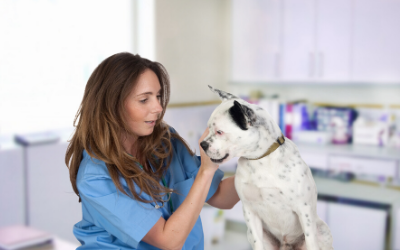
The COVID-19 pandemic has impacted our daily activities – right down to taking Fido or Fluffy to see your veterinarian. While many veterinary hospitals are opening up to see more than just emergency or urgent care patients, changes to how your veterinary hospital operates and sees their furry and feathered patients are likely here to stay for a while longer. Some of these changes may include curbside drop off, limited access to the hospital, and perhaps the use of telemedicine for certain appointments.
Regardless of the new protocols that your veterinary hospital has put in place, the importance of preventive medicine remains for the well-being of your furry and feathered friends. Unvaccinated pets pose a threat to the overall health of animals in your community and the use of preventives to avoid flea and tick infestations or a devastating heartworm infection are as important now as they always have been.
Call your veterinary hospital to find out how they’re seeing patients during this period, and book an appointment to “catch up” today!
Some of the preventive measures—and the importance of catching up now—that you may have missed due to the COVID-19 pandemic are discussed below.
Annual or biannual wellness checks are crucial in preventive medicine. Fluffy and Fido can’t tell you if something feels “off” and your veterinarian is trained to pick up on these subtle changes. Bloodwork to check how prescription medications are working, or screening for diseases in senior pets are important to prevent more serious repercussions down the road. With all the extra time spent at home with your pet over the past several weeks, you may have noticed bumps or lumps or other subtle changes with your pet. Now’s the time to get things checked out before they become serious concerns. Early management of disease or illness can improve the prognosis and outcome for your pet.
It’s heartworm season in many parts of North America! While winter seemed to hang on forever in some areas, spring (and summer) temperatures are here! You may have “missed” your regularly schedule heartworm appointment but fear not! It’s not too late to start your heartworm preventives, since mosquitoes are just starting to come out in some areas. If your pet is on year-round preventives, now is the time to renew your prescription. Prevent a devastating life-threatening illness by calling your veterinary healthcare team today and get your pets protected!
You may not have seen any ticks or fleas on your pets yet this year, but you definitely want to keep it that way! Now that the warmer weather has arrived, one way to get exercise and maintain physical distancing is hiking. However, physical distancing means nothing to fleas and ticks! Tick-borne diseases such as Lyme disease, Rocky Mountain Spotted Fever, and ehrlichiosis can have significant health impacts on pets if not caught and treated early. No one wants a flea infestation, least of all your pets! And don’t forget, fleas can also carry a type tapeworm – worms are not pleasant discovery for pet owners! Now’s the time to make sure your pet is ready for summer and protected from these pests.
Your pet may have missed his annual vaccinations during isolation. Rabies, a fatal non-treatable disease, is caused by a virus that can affect all dogs and cats – even indoor pets. All it takes is one quick encounter with an infected animal, such as a raccoon in the yard, or a bat that found its way into your home. With rabies outbreaks in wildlife populations in various jurisdictions, vaccinating your pet should not be put off. Additional vaccinations that your dog may have missed depending on his vaccine schedule, your geographical location, and your lifestyle include: distemper, parvovirus, hepatitis (canine adenovirus-2), leptospirosis, Lyme disease, canine parainfluenza virus, kennel cough, and canine influenza. Additional vaccinations that your cat may have missed depending on her vaccine schedule, your geographical location, and your lifestyle include: feline panleukopenia (FPL), feline viral rhinotracheitis (FVR), feline calicivirus, feline chlamydiosis, feline leukemia disease complex, feline infectious peritonitis (FIP), and feline bordetellosis. Keeping your pet’s immunizations up-to-date is important for his/her overall health.
As we move out of isolation, it’s time to slowly start resuming our “normal” activities, though these activities may look and feel different. Call your veterinarian today to find out what your pet may have missed!